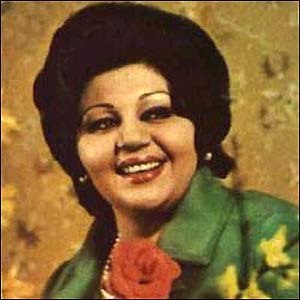Mention the name Hayedeh to an Iranian and many will say she is one of the greatest singers of all time. Even Iran’s former queen or Shahbanu Farah Pahlavi called her the ‘Persian Maria Callas’.
Hayedeh, or Ma’soumeh Dadehbala, was born in Tehran in 1942 and in the years leading up to the Islamic Revolution was one of the country’s most popular entertainers. Unlike other female singers of her generation, Hayedeh’s appeal lay in an extraordinary vocal range and ability to sing both classical and pop music. She studied the Persian vocal music of Avaz and slowly grew to prominence in the late sixties on a Radio Tehran programme called Golhayeh Rangarang (Colourful Flowers) working alongside a series of composers who helped develop her talents as a contralto. When she sang, her voice’s haunting timbre captured the imagination of legions of fans. One of her most famous songs ‘Gole Sangam‘ (Stone Flower) has been covered by many artists, though it is Hayedeh’s first breakthrough hit ‘Azadeh‘ (Free) that truly illustrates the sheer power of her voice.
Even before the Islamic Revolution, Hayedeh made the decision to leave her homeland and headed to the UK in 1978. After the Revolution, Iran’s new leaders summoned Hayedeh to court on the grounds that she promoted “Royal Music” since she was known to be a supporter of the Pahlavi family. She ignored their warnings and in 1982 relocated to the United States. The Islamic Revolution pushed many recording artists into exile, women performers being barred from singing in public and for those who stayed, such as the famous Googoosh, it became impossible to continue one’s career. Hayedeh’s younger sister Mahasti, a successful singer in her own right, chose to settle in California to be near her sister, a great deal of speculation arising also as to the degree of rivalry that existed between them.
While it proved difficult at first for Hayedeh to enjoy the same success abroad, as the years went by, large expat communities of Iranians sprang up across North America and Europe, and it was through their support that her career once again took off. She even performed in Israel for the growing Persian-Jewish community, appearing at London’s Royal Albert Hall also. Nevertheless, her music reflected her own unhappiness about events in her country such as the devastating Iran-Iraq war, the songs ‘Roozhaye Roshan Khodahafez‘ (Goodbye Bright Days) and ‘Faryad‘ (Scream) being notable examples.
Hayedeh’s personal life was often chaotic. She divorced and married three times, struggling with alcoholism and cocaine addiction, was a diabetic, her weight ballooning also due to depression. In January 1990, following a performance at the Casablanca Club in San Francisco, Hayedeh collapsed and died not long after as a result of a heart attack. She was only 47 years old.
Since her death, the popularity of Hayedeh’s music has shown no sign of waning. Many Iranians and music lovers worldwide who delve into Iran’s rich musical past concede that Hayedeh’s contribution to music is without parallel. No female singer has left such an imprint on Iran’s cultural heritage.
Emily Boulter is a writer based in the Netherlands. She is a columnist for the Dutch business magazine “The International Correspondent” and the creator of the current affairs website www.frombrusselstobeirut.com.



No Comments Yet!
You can be first to comment this post!